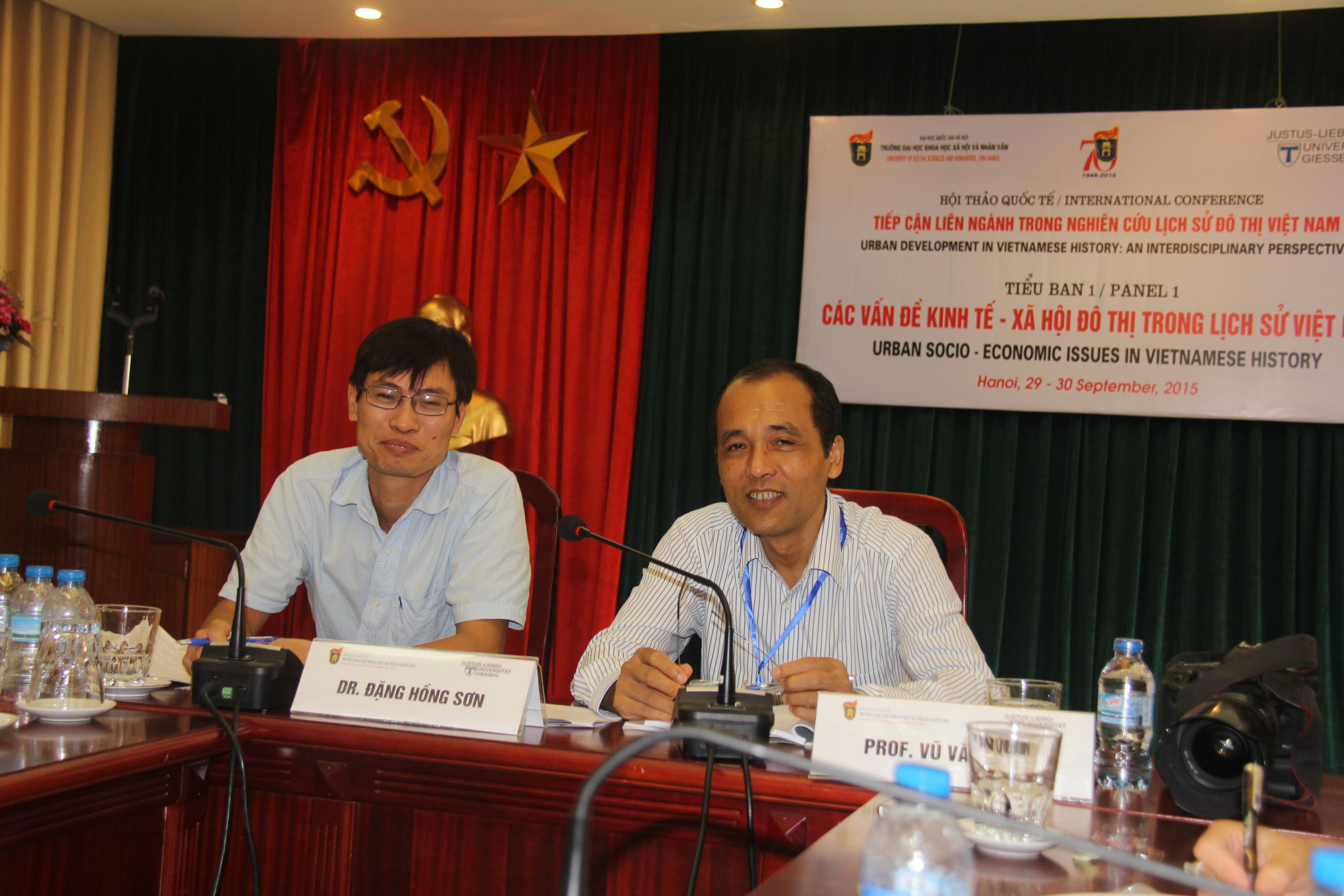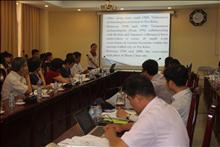Urban development is currently one of the widely recognized issues in the face of rapid urbanization in Vietnam and developing countries alike. Urban history is also an important aspect of urban studies because it can reflect the development of a city throughout its history, from pre-modern period to early modern and contemporary eras. In each historical period, a city possesses a distinct set of features, such as Thang Long as a capital of Greater Vietnam in the past and Hanoi as the current capital of Socialist Republic of Vietnam. If Thang Long was known as a marvelous imperial city as seen through its architectural, economic, social and cultural features, Hanoi today is a buzzing, vibrant and modern metropolitan under the impact of urbanization.

Dr. Dang Hong Son and Assoc. Prof. Dr Vu Van Quan as chairmen of one of the panels
In this context, the study and examination of urban history is important as it provides for comparative analysis between a city in the past and its modern counterpart, based on which experiences and solutions can be drawn to cope with the current urbanization in Vietnam. As a result, the conference “Urban development in Vietnamese history: An interdisciplinary perspective” was held to discuss the issues relevant to Vietnam's and world urban history, from geography to urban structure, urbanization and the exchanges between cities. The papers in this conference used various methods and approaches to study urban history, reflecting the widespread interdisciplinarity and multidisciplinarity of social sciences and humanities. The conference focused on Vietnam's and world urban history based on 3 themes:
- “Pre modern issues” with such papers as “On the Hybridity of Vietnamese cities: The case of Thang Long – Hanoi” by Assoc. Prof. Dr Nguyen Thua Hy (Faculty of History, USSH), “On the multiple boundaries surrounding Vietnamese ancient cities” by MA. Vo Thi Phuong Thuy (Institute of Historical Studies, Vietnam Academy of Social Sciences), “A historical approach in Vietnamese urban studies” by Assoc. Prof. Dr Tran Kim Dinh (Faculty of History, USSH); “The design of Thang Long City under Ly dynasty and Former Naniwa Palace in Japan” by MA. Pham Le Huy (Faculty of Oriental Studies).
- “Early modern and modern issues” with such papers as “Climating an Empire: Natural Disasters and Socio-Economic Vicissitudes in 17th century Tonkin” by Assoc. Prof. Dr Hoang Anh Tuan (Faculty of History, USSH), “Cities on the move: 17th and 18th century Vietnamese littoral urbanization in the context of local and global competition” by PhD. Do Thi Thuy Lan (Faculty of History, USSH) and M.A Vu Duc Liem (Faculty of History, Hamburg University); “Indo-Dutch Community in Transition: Fort Cochin during the Napoleonic Wars (1784-1830)” by Assoc.Prof. Amjama Singh (University of Groningen, The Netherlands); “Feminist space: expansion of female services in urban Hanoi during the French occupation” by PhD Tran Thi Phuong Hoa (Institute of European Studies, Vietnam Academy of Social Sciences).
- “Contemporary issues” with such papers as “The Protection of human and natural environments as an issue of international law: the Impact of the American War in Vietnam” by Prof. Detlef Briesen (Universitat Giessen), “Uban morphology – understand the history of cities through built space” by PhD. Arch. Nguyen Trung Dung (Institute for national urban and rural planning, Vietnam); “We will not leave the forest. We will not leave the land – Internally displaced persons and impact on the forest in Khammam district” by Dr. David Pickus (Renmin University of China).

